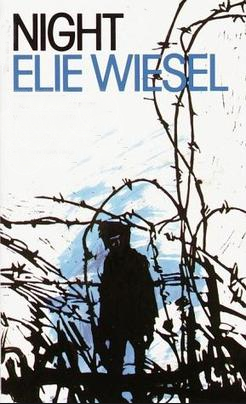Night
by Elie Wiesel
Reviewed by Ed Lengel

One of the most compelling moments in television history occurs at the end of the 11th episode, titled “Knowledge or Certainty,” in the 1973 BBC documentary series The Ascent of Man about the history of science. In it, series host Jacob Bronowski, a Polish-born philosopher and mathematician, visits the crematorium at the Auschwitz death camp, where many of his relatives perished during the Holocaust. Standing beside a murky pond, Bronowski speaks to the common assertion that science dehumanizes people and turns them into numbers. Calling that argument “false—tragically false,” he says:
This is where people were turned into numbers. Into this pond were flushed the ashes of some four million people. And that was not done by gas. It was done by arrogance. It was done by dogma. It was done by ignorance. When people believe that they have absolute knowledge, with no test in reality, this is how they behave.
Science, he says, is by contrast a “very human form of knowledge . . . a tribute to what we can know, although we are fallible.” Quoting Oliver Cromwell, Bronowski appeals for the critical importance of self-reflection: “think it possible you may be mistaken.”
Stepping forward spontaneously into the pond, where he stands ankle-deep, Bronowski reaches down and lifts a handful of ashes and mud. “We have to cure ourselves,” he says, “of the itch for absolute knowledge and power.” Instead, humanity should be the focus, including for advocates of science: “we have to touch people,” he concludes.[1]
At the core of Bronowski’s appeal was a fundamental understanding: that the murder of six million Jews during the Holocaust was not distant history, but a living manifestation of the human potential for evil—a potential very much with us today. It can happen again—and the origins of murderous hate in dogmatic thought have been very much on view since the events of October 7, 2023. With that in mind, few reminders could be more timely than that of Elie Wiesel’s immortal literary testament Night, first published in 1960.
Born in Romania in 1928, Wiesel and his family—like Bronowski’s—fell victim to the Holocaust that engulfed Europe during World War II. Rounded up along with other Jews by the Nazis—actively assisted by local civilians—Wiesel was sent to the death camps at Auschwitz and Buchenwald. In Night, an episodic series of memories and impressions records Wiesel’s loss of faith—and–hope as he witnesses the death of his father and other members of his family, along with countless more innocent people. “Everything came to an end,” he remembered; “man, history, literature, religion, God. There was nothing left. And yet we begin again with night.”
At just about one hundred pages, Night shouldn’t be classified as a memoir. Instead, it’s abstracted from a much longer work that Wiesel compiled in Yiddish in 1954, despairingly titled, “And the World Remained Silent.” The author would later complete two more books, Dawn and Day, to assemble a trilogy. In itself, Night doesn’t attempt to record every episode of Wiesel’s experiences, but to highlight the central experience of total loss—loss that, according to Jewish tradition, precedes rebirth.
Wiesel, who received the Nobel Peace Prize in 1986, became a vocal advocate for humanity, speaking out against cruelty, intolerance, and–above all –indifference to suffering. Indeed, Night’s prime accusation is not so much against the primary acts of violence against the Jews by the Nazis and their accomplices, but against the world’s failure to act. It was this realization that motivated Wiesel’s global activism before he died in 2016: his goal was always to raise awareness and a sense of responsibility among those who might otherwise have considered faraway acts of oppression and genocide to be none of their concern. Arguably, though, there should be an essential balance of understanding between Wiesel’s exposure of indifference, and what Bronowski called the temptation to a “push-button order” that generates active hate, cruelty, and murder. Human self-reflection, and willingness to embrace self-criticism—the only sure qualities for ensuring that events like the Holocaust are never repeated—are in alarmingly short supply today.
Ed Lengel is an author, a speaker, and a storyteller.
[1] https://www.youtube.com/watch?v=ltjI3BXKBgY. A year after filming, Bronowski died of a heart attack. See also “The Dangers of Certainty: A Lesson from Auschwitz,” New York Times, February 2, 2014, https://archive.nytimes.com/opinionator.blogs.nytimes.com/2014/02/02/the-dangers-of-certainty/




